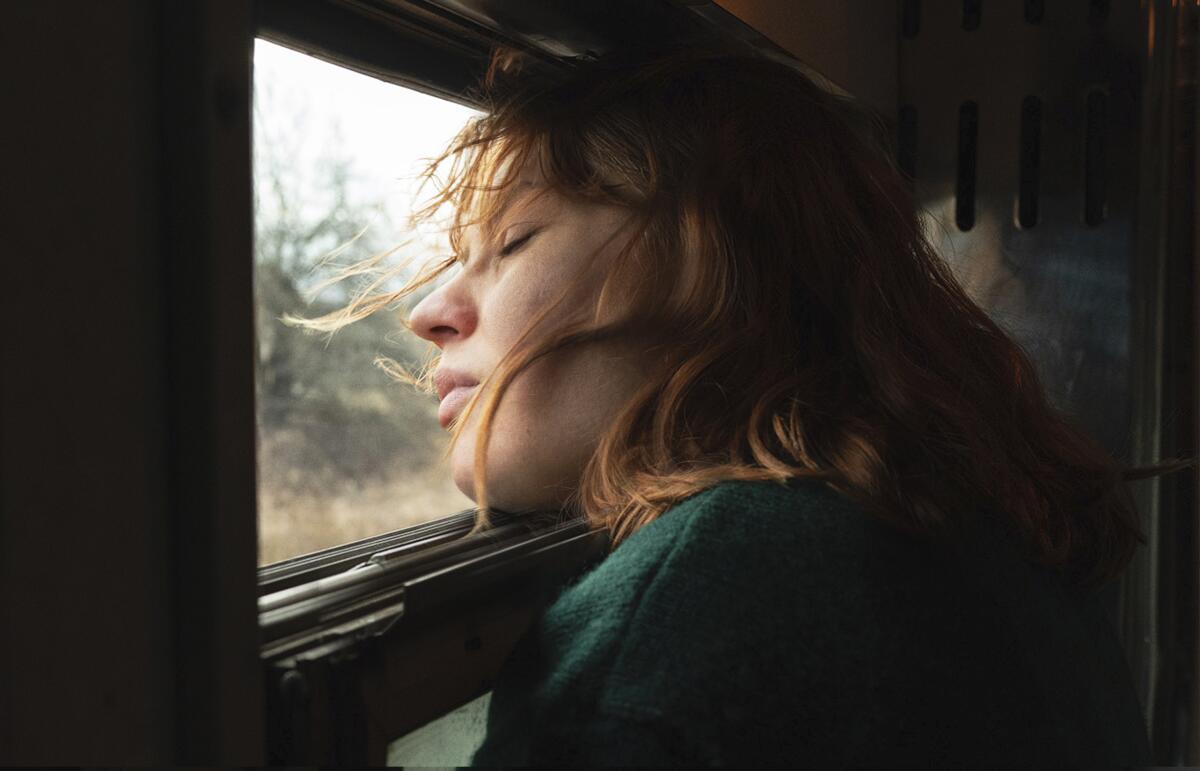Review: Finland’s Oscar submission ‘Compartment No. 6’ reforms the love story

The Times is committed to reviewing theatrical film releases during the COVID-19 pandemic. Because moviegoing carries risks during this time, we remind readers to follow health and safety guidelines as outlined by the Centers for Disease Control and Prevention and local health officials.
Unlikely love stories in movies are rarely truly unlikely (if it’s been called a love story, you know what’s going to happen), and, if we’re being clinical, are rarely about love that isn’t fizzy, charming or passionate. The ones primed to give us what we want, instead of what will surprise us, might be better termed “expected romances.”
It takes an offbeat gem to provoke that kind of realization, and the curiously affecting, understatedly wise “Compartment No. 6” — set in the early ‘90s primarily on a train journey from Moscow to the Arctic Circle — is that wonder. (This year’s Cannes Grand Prix co-winner, it’s also Finland’s entry for the Oscar for international feature film.) In stripping genre ornamentation away to get to what brings people together in stark, lonely, and in this case, mighty cold circumstances, Finnish filmmaker Juho Kuosmanen (“The Happiest Day in the Life of Olli Mäki”) has achieved something genuinely unlikely, and quietly renewing about what a love story can be.
In the beginning, Laura (Seidi Haarla), a Finnish student in Moscow, certainly believes she’s already in a love story. Beaming and naïve, she basks in the bedroom eyes of her lit professor lover Irina (Dinara Drukarova), who has planned a trip to the Arctic port of Murmansk to see its petroglyphs, rock drawings thousands of years old. When Irina bails at the last minute (hint hint), Laura — having declared an interest in archaeology, perhaps because of this trip — decides to make the overnight train journey anyway. What she gets instead for a co-traveler in her cramped compartment is a wiry, vodka-swilling Russian miner named Ljoha (Yuriy Borisov) with a belligerent sense of humor and he won’t leave her alone.
Laura futilely tries to get some distance, as the spell from her time in Moscow quickly dissipates. At pay phones during stops, she tries to contact Irina and on the train turns to footage on her camcorder for wisps of happier times. But these efforts only clarify how isolating her situation is, while also reminding what days were like before cellphones when solo travel could be a singularly meditative swirl of freedom, loneliness and self-reflection. (As scenarios depicting our pre-online life go, it’s a slyly poignant one in that regard.)
Of course, as Laura resigns herself to engaging with her unchosen train mate, Ljoha’s veneer of off-putting toughness falls. What’s revealed is someone more attentively protective than what his shaven head and intense eyes might suggest, and awkwardly vulnerable, as when he reacts hurtfully to Laura inviting a handsome, guitar-playing Finnish stranger into their compartment. Ljoha may be Irina’s complete opposite, but as their connection deepens — over laughs, drinking, confessions and, in a few instances, just being in the right place at the right time — we sense that he might be more like Laura than she realizes.
Haarla’s and Borisov’s rewarding, unfussy performances are marvels of shell-cracking, but also of how looking and listening can be sublime gestures. Their portrayals shine inside the tangible chill of J-P Passi’s cinematography and Kuosmanen’s intimate, intuitive direction, which recalls a cook’s watchfulness in trusting that a well-tended simmer will blend the flavors just so. One of those ingredients is the wittily well-structured screenplay by Andris Feldmanis, Livia Ulman and Kuosmanen, who understand when less dialogue is more.
As “Compartment No. 6” reaches its destination — and getting to the petroglyphs brings its own risks and rewards — our hope for Laura and Ljoha feels suitably organic, rather than tied to how other movies engineer meet-cutes into ever-afters. Here, as we warm to how they stumble toward seeing the truth in each other, it’s about what is right for the alone-together bond these two souls create. It makes for a take on the love story as fresh, resonant and honest — so yes, unlikely — as you’ll find in a contemporary film.
'Compartment No. 6'
In Russian and Finnish with English subtitles
Not rated
Running time: 1 hour, 47 minutes
Playing: Starts Nov. 19, Laemmle Royal, West Los Angeles, one-week Oscar qualifying run
More to Read
Only good movies
Get the Indie Focus newsletter, Mark Olsen's weekly guide to the world of cinema.
You may occasionally receive promotional content from the Los Angeles Times.










